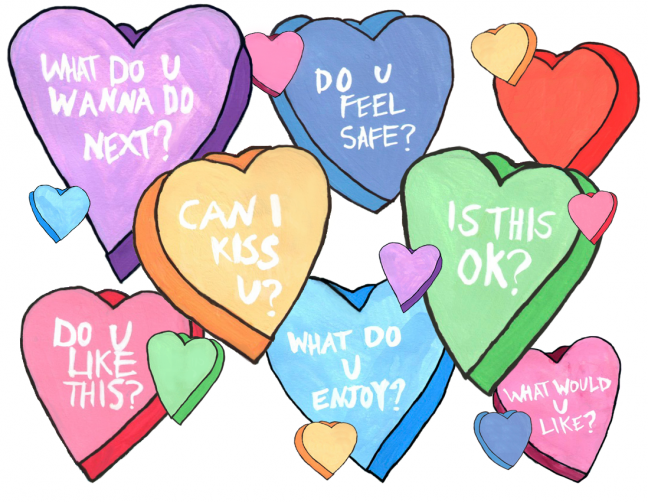When Jeung Bok Holmquist and Ella Sklaw roamed the aisles of Valentine’s Day merchandise, among hundreds of cards about love and intimacy, one important message was missing.
So last week, you may have noticed something different about Snapchat — an exclusive, location-based geotag that went live in the Madison area from Feb. 13 at 4 p.m. to Feb. 14 at 4 p.m.
Consent Hearts combined a traditional element of Valentine’s Day with something not so traditional, though it should be — a conversation about consent and communication between two individuals becoming intimate.

Students Ella Sklaw and Jeung Bok R. Holmquist teamed up with University Health Services to share their artwork with the rest of campus in an easily accessible way for students and young adults, to spread an important message demanding more attention.
“[Sklaw] has previously done other consent focused Snapchat filters and projects in the past, and this year she got into making her own art and came to me for the graphic design/digital aspect of the project,” Holmquist said. “We brainstormed and crowdsourced consent phrases that we could potentially include in our art, Sklaw painted the hearts and phrases and I prepared the images for digital use.”

Due to constant notifications of reported sexual assault incidents on campus, the duo felt there was a need for this project now more than ever.
Holmquist and Sklaw both understand consent may be a bit of an uncomfortable topic for some people to talk about because it has never been normalized. Their geotag aims to show others it doesn’t need to be this way.

“I think that being sponsored by UHS for this project was really important,” Holmquist said. “UHS serves the student population, it is directly linked with the University and it is an established entity on campus. Partnering with them gave our project credibility from the start. A lot of intersectional feminist projects are often brushed off as niche or inaccessible to larger populations, but that just isn’t the case.”
UHS is a great resource for victims seeking both medical or emotional support through their violence prevention and survivor services.
In response to faculty sexual misconduct allegations, UW recognizes need for improvement
Holmquist believes consent should extend beyond sexual encounters between partners and should be practiced in different aspects of one’s life as well. One’s right to say no should always be an option, or the individual will feel powerless in a multitude of situations, sexual or not.
A greater emphasis on communication between individuals, no matter the relation, is key towards creating a happier and healthier environment here on campus.
UHS aims to expand mental health services through new online program, added staff
“I think everyone needs to keep promoting the message that consent is required to engage with anyone, whether it be physically or otherwise, and that sexual violence of any kind is unacceptable,” Holmquist said.
Unfortunately, the fight against rape culture may be a long and hard one, as it is so ingrained in American society today. But it stops with each individual choosing to refrain from making offensive rape jokes, objectifying women and perpetuating this power imbalance in a multitude of ways.
It stops with whoever is reading this article and decides to choose kindness over cruelty.

Far too many still lack respect for the right to consent.
“Survivors deserve to be heard, we deserve help and we deserve to take up as much space as possible,” Holmquist said. “Be selfish and take care of yourself. Remember: Whatever happened to you is not your fault and was never your fault.”
If your friend is a survivor, Holmquist’s best advice is simply to love them, care for them and show them they deserve happiness and affection in their lives. Every survivor is different and therefore might need support in different ways than others, but they need support, love and kindness regardless. Even a few small gestures can help someone who is hurting.
Hump Day: Tips for combatting seasonal depression to have a successful cuffing season
Sklaw and Holmquist’s passion towards helping survivors and sexual assault advocacy does not stop at this Snapchat filter. They fused their creative energy to produce cards they are selling on the internet — yes, they accept Venmo.
The main motivation behind their consent-related projects is to show others just how easy it can be to use phrases which will allow for greater communication and ultimately greater experiences.
“I just want to make it clear that consent is not as simple as checking a box yes or no,” Holmquist said. “Consent is a complicated and nuanced topic that must be addressed and respected. If you take a look at the various phrases we chose, you can see the different ways consent
can be communicated.”








